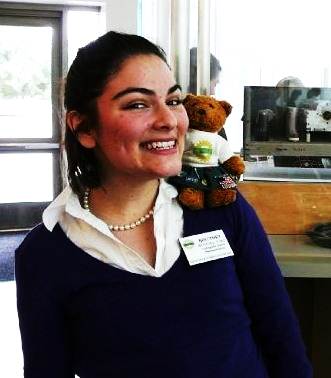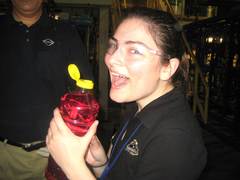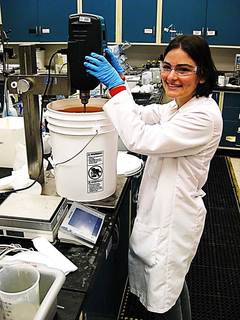
Name Brittney Elko
- Education B.S. Engineering Science, focus in Chemical Engineering, Trinity University, TX
- Target Audience High School

With all the germs and bacteria out there, what would a world without cleaning products look like? Chlorine bleach, formulated by chemical engineers like Brittney Elko, is one of the only household cleaners regulated by the U.S. Environmental Protection Agency (EPA), which means that it's been tested and shown to kill harmful germs and bacteria. Read on to learn why a job in the household product industry might be the job for you!
I am a Product Development Scientist for Clorox, a company that develops and produces household products. I work in the cleaning and homecare division to chemically engineer products on the market like Formula 409, Pine-sol, Tilex and bleach products. Most of my work pertains to the formulation of new products. When formulating a new product, the idea for the product, or the product concept, comes from working with consumers and our company's marketing division.
in the cleaning and homecare division to chemically engineer products on the market like Formula 409, Pine-sol, Tilex and bleach products. Most of my work pertains to the formulation of new products. When formulating a new product, the idea for the product, or the product concept, comes from working with consumers and our company's marketing division.
I always loved problem solving growing up and chemical engineering was the only subject that really interested me when I entered college. Once I graduated from college I knew I wanted to do work that combined all the skills I learned in college while still allowing me to work with people and see the impact of my work in the world. Going into the consumer product industry allowed me to do all of those things.
My days vary depending on what the team is working on. My days can consist of formulating chemicals in the lab that can be used to clean something specific like mold or mildew. Or, I could be collaborating with our marketing team or consumers to better understand the demands of our customers. I could also be helping with community outreach initiatives, because Clorox takes corporate responsibility very seriously.
 Since I work to develop new business and new products, I get to be creative and do a lot of brainstorming with my team to come up with new ideas for products that are not currently on the market. We are always trying to develop products that help consumers with their everyday cleaning or household chores. At the end of the day, it's exciting to see the products I helped develop end up on the grocery store shelves and know that they are helping make peoples' lives easier.
Since I work to develop new business and new products, I get to be creative and do a lot of brainstorming with my team to come up with new ideas for products that are not currently on the market. We are always trying to develop products that help consumers with their everyday cleaning or household chores. At the end of the day, it's exciting to see the products I helped develop end up on the grocery store shelves and know that they are helping make peoples' lives easier.
My dad is a mechanical engineer and he was always encouraging us to explore engineering and math. As a result I was always driven to work really hard at math & science and found myself enjoying those types of subjects over others that were less problem solving (history, etc). I liked that even if I didn't remember the answer, there was a way to figure it out with some thought and work.
There wasn't a defining moment when I decided to become an engineer, but I have always had a strong interest in problem solving, which is kind of the basis of engineering. Growing up I liked Tinker-toys and my favorite TV show was MacGyver, which is a show about a special agent who is armed with so much problem-solving ingenuity.
I think the biggest challenge was being a female in an engineering program. Female participation in engineering is definitely growing, but there were not a lot of women in my engineering classes in college. I guess I was really lucky in terms of my support network though. In high school, my parents were really supportive of my pursuit of engineering and in college the department head of the engineering school was very supportive of women.
Both of my parents were incredibly supportive of me becoming an engineer. My dad is a mechanical engineer, and while my mom isn't trained in engineering, she works with a lot of engineers. They were able to help me identify that this was something I was really good at and that I could pursue as a career.
Engineering used to be very specific, but the scope of engineering has really expanded. You're not just working alone in a lab or a shop anymore. Now, engineers work in many different industries and collaborate with a lot of people so it's important to be well-rounded and have good communication and writing skills. Any activities that help develop these skills would be helpful for high school students. Also, SWE, the organization I belong to, has so many great resources for students interested in an engineering career. High school kids should check out any of the engineering association websites, such as swe.org, shpe.org or nsbe.org for activities to do or engineering events in their area. And, if you want to pursue engineering, any accredited university is fine. You really need to focus on the type of college experience you want to have and then choose a school based on that. Based on my experience it is really important to have an adaptable skill-set, unless you are certain of the type of work you want to do when you graduate. Sometimes receiving a more general engineering degree, like mechanical, electrical, civil or chemical engineering can help you traverse the workforce a little easier because you are suited for many different types of work.
We are always looking for sustainable products, but there will be an even bigger push for this in the future. Things like minimizing product packaging and using safer chemicals or ingredients in our cleaning products are constantly being looked at. As America becomes more health-conscious, consumer product companies will be making product ingredients available to consumers online. You already see a lot of this in the food industry, but it will expand into many other industries over time. Future scientists or chemical engineers will need to keep the product experience good for the consumer, but also integrate the things that people want, such as sustainability.
Chemical engineering for consumer products is a growing field and is really all about innovation. We're going to need fresh, new ideas and people with different thought processes to execute all of our industry goals. Students pursuing a career in this field can look forward to using their skills for innovation.
(adapted from clorox.com)
Formulation - any mixture or substance prepared according to a particular formula
Formula 409 - anti-bacterial all-purpose kitchen cleaner
Innovation - something new or different introduced
Pine-sol - household cleaner with a pine scent - often used on floors
Sustainable - capable of being supported or maintained
SWE - Society for Women Engineers
Tilex - mold and mildew cleaner
(adapted from dictionary.com)
Why did you choose your major? Did you always know this is what you wan…
Lisa Ingham excels on the field and in the classroom as an Engineering …
Why did you choose your major? Did you always know this is what you wan…